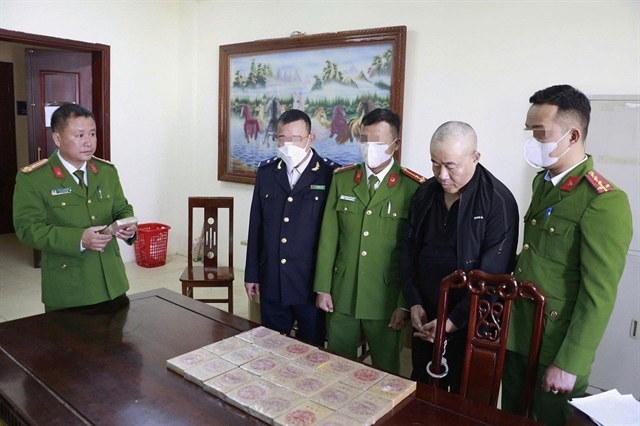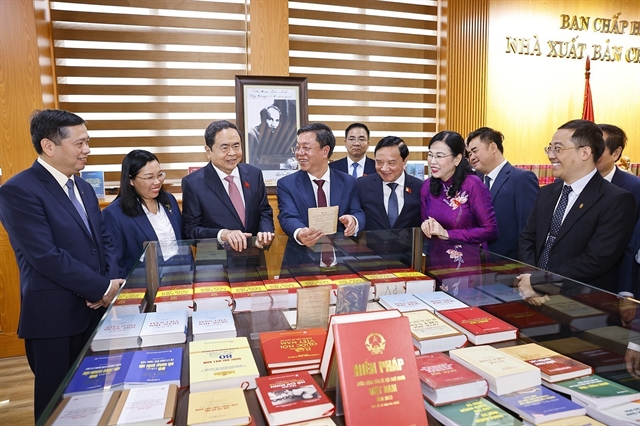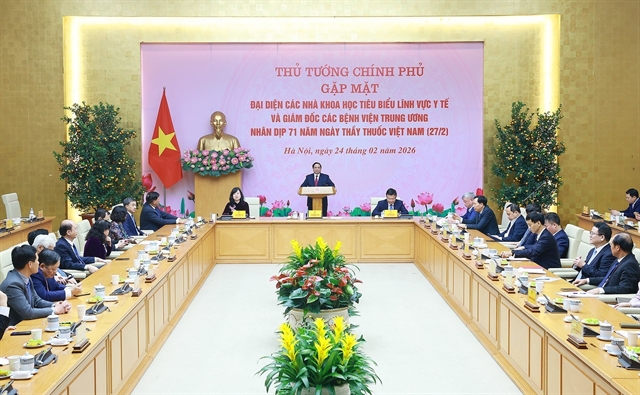 Society
Society

.jpg)
|
| Former Deputy Health Minister Trương Quốc Cường on trial on Thursday. — VNA/VNS Photo An Đăng |
HÀ NỘI — The People’s Court of Hà Nội has begun the first instance trial of former Deputy Health Minister Trương Quốc Cường and 13 other defendants accused of trading counterfeit cancer medicine labeled as Health 2000 Canada.
The trial panel consists of five people: two judges and three people's jurors. Judge Đào Bá Sơn, who is Deputy Chief Justice of Hà Nội’s People's Court presided over the trial.
Three prosecutors of the Supreme People's Procuracy and two prosecutors of Hà Nội’s People's Procuracy are assigned to exercise the right to prosecute and trial supervision in court.
Among the 14 defendants, former Deputy Minister of Health Trương Quốc Cường and two other defendants, Nguyễn Việt Hùng, former deputy director of the Health Ministry’s Drug Administration (DAV), and Lê Đình Thanh, former official of HCM City Customs Department, are charged with lack of responsibility, causing serious consequences.
Two defendants, Phạm Hồng Châu, former head of the DAV’s Drug Registration Department, and Nguyễn Thị Thu Thủy, former deputy head of the DAV’s Drug Price Management Department, are accused of abusing positions and powers while on duty.
Meanwhile, nine defendants, including six executives and employees of VN Pharma Company, two from H&C International Maritime Trading Co.Ltd and a former general director of the Saigon Pharmaceutical Company, are charged with trading counterfeit medicine.
They are Nguyễn Minh Hùng, chairman of the Board of Directors and General Director of VN Pharma Company, Nguyễn Trí Nhật, Deputy General Director of VN Pharma, Ngô Anh Quốc, Deputy General Director of VN Pharma, Phan Cẩm Loan, Head of Import-Export Department of VN Pharma Company, Lê Thị Vũ Phương, Chief Accountant of VN Pharma, Nguyễn Thị Quyết, an employee of Import-Export Department of VN Pharma Company, Võ Mạnh Cường, Director of H&C International Maritime Trading Co. Ltd, Phạm Quỳnh Trang, an employee of H&C International Maritime Trading Co. Ltd, and Phạm Anh Kiệt, General Director of the Saigon Pharmaceutical Company.
The court has summoned six organisations and individuals, including representatives of the Ministry of Health, the Drug Administration of Vietnam, the General Department of Customs, HCM City’s Customs Department, VN Pharma Company, H&C International Maritime Trading Co.Ltd. About 30 witnesses were present at the trial.
There are more than 30 lawyers participating in defence for the defendants. Trương Quốc Cường alone has six lawyers.
According to the indictment, Nguyễn Minh Hùng, chairman of the Board of Directors and General Director of VN Pharma Company and his accomplices prepared applications for seven drugs labelling Health 2000 Canada for circulation in Việt Nam from 2008 to 2010. The drugs were later approved despite their fabricated documents.
After that, Hùng and others accused traded and imported a large number of counterfeit drugs for domestic consumption, causing economic and health problems to patients.
The defendants faked a range of documents to change the origins of the drugs to import 838,000 boxes into Việt Nam. Of that, 624,000 boxes were then resold to drug stores, hospitals and pharmaceutical businesses, bringing a profit of more than VNĐ31.5 billion ($1.3m) to the defendants.
Cường, who worked as head of the DAV from 2007 to 2016, had improperly and inadequately performed his assigned responsibilities, lacked responsibility in assessing and granting licences for the drugs, and lacked supervision and examination over those assessing and registering the drugs, leading to the approval of the applications for the import and consumption of the six counterfeit drugs worth over VNĐ 148 billion (US$6.4 million) in Việt Nam.
On August 2014, the DAV sent two emails to the Canadian Embassy in Việt Nam to verify information about four Canadian pharmaceutical companies operating in Việt Nam, including Health 2000 Inc and Helix Pharmaceuticals Inc.
The DAV received two response emails. The email dated October 2, 2014 from Canadian Food Inspection Agency read that neither of the companies held valid drug manufacturing licences nor had valid medicinal product identifiers.
As a result, these companies did not have any products licensed for circulation in Canada.
Cường received information about the suspected origins of the drugs but did not give direction to stop their circulation or recall and destroy them.
On November 13, 2014, Cường directed the DAV’s deputy director Nguyễn Việt Hùng to send a document to the Ministry of Public Security’s Department of Internal Political Security to require the verification of information about Health 2000 Canada. He also asked the DAV’s deputy director Nguyễn Tất Đạt to send a document to the General Department of Customs to suspend the import of drugs manufactured or supplied by Health 2000 Canada into Việt Nam.
The import of the drugs was officially suspended on December 1, 2014.
Previously, on November 21, 2014, the Department of Internal Political Security sent an urgent document warning Cường about the drugs manufactured by Health 2000 Inc, which had the same violation on counterfeit products as those of Helix Pharmaceutical Inc.
Cường did not perform properly despite receiving many warnings about the drugs.
As a result, domestic medical establishments continued to use supplied counterfeit drugs labelled Health 2000 Canada without clear origins, including H2K Levofloxacin, H2K Ciprofloxacin, Kaderox-250 and MGP Moxinase-625, to treat patients at a total value of over VNĐ3.7 billion ($160,190).
Cường's behaviour violated Article 38 of the Law on Pharmacy 2005, Article 13 and Article 27 of the Ministry of Health’s Circular 09/2010/TT-BYT issued on April 28, 2010 on the management of drug quality.
The trial is expected to last a week. — VNS




